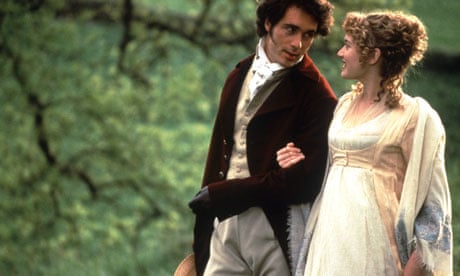I might find it hard to live this down. My favourite film, a costume drama? A period romance? Jane Austen? With lead roles played by head-girl Emma Thompson and Hugh Grant in classic floppy-haired, shy-but-charming mode? What happened to Tarkovsky and Kiarostami? But I can't help it: I know Ang Lee's Sense and Sensibility is not challenging, I realise it has lots of bonnets, and that I should prefer Trainspotting, which came out in the same week early in 1996, but I'm extremely partial to this film.
One reason is the writing. Thompson spent five years wrestling with the screenplay, trying to stay tuned to Austen's dry wit but also making a modern entertainment out of an easy-to-dismiss, over-familiar, will-they-or-will-they romance. Apparently, at an advanced stage, her computer crashed and she couldn't retrieve the relevant file. A repairman couldn't help, so she took the computer in a cab to Stephen Fry, who – boffin that he is – managed to rescue it.
Well done, him: this is an exceptional screenplay, crisply and skilfully done. (It won an Oscar, remember.) Thompson plays fast and loose with Austen, cutting huge chunks out of the novel, adding whole scenes; a mere six or seven lines from the book actually make it into the film. The final result of all that work is an appealing half-parody of a style, catering to a 20th-century audience but not assuming that its members have been lobotomised (Downton Abbey, anyone?). And a story that keeps its force as a study of class and money and character, but aims mostly for sheer pleasure – and to be funny.
Thompson pretty much invented a whole character for the diffident hero, Edward Ferrars (Grant). Out of her head (not out of the novel, as many assumed) came the scenes in which he and Elinor Dashwood (played by Thompson herself) fall for each other in the house and grounds of Norland Park. She wrote the part specially for Grant, and it shows: he gets amusing lines, delivered in the stumbling, aren't-I-adorable way that was already becoming his trademark.
You either like this kind of oh-so-English thing, or you don't. I have to admit I do (is there something genetically wrong with me?), yet I can see what the reviewer in the Times meant when he wrote: "Grant's tongue-tied manner and physical bearing suggests someone stuffed. Hair tousled, he stands awkwardly … A taxidermist could not have done better." When Elinor teases her hopelessly romantic sister Marianne (Kate Winslet) about her instant infatuation with the dashing Willoughby (Greg Wise), the effect is some distance the right side of overdone; likewise the comedy of the despairing putdowns delivered by Hugh Laurie as Mr Palmer.
From the beginning, too, we are given an enjoyable villain: Harriet Walter as the tight-fisted, self-exalting Fanny Dashwood, who persuades her husband, John, on the death of his father, to give his half-sisters barely enough to live on. Soon she's moving into Norland, checking the silver, and making herself intolerable to the grieving women who are to be ousted. And then, almost instantly, we are given a hero: Fanny's brother, the stuffed Grant. So the plot begins to spool out enjoyably: Marianne and Willoughby, Elinor and Edward, Lucy Steele's secret, dramatic falls, deadly chills, ballroom faints and cancelled picnics.
Sense and Sensibility – the film – doesn't deny itself many stereotypes of the form, but it works in another crucial way. Just as the bleached, ordered look of it is restrained enough to ward off sentimentalism, so we genuinely come to believe in the depth of feeling dammed up behind the reserve and protocol. If you've seen the film, you'll remember the now-celebrated moment when Elinor discovers that Edward isn't, after all, married. Ang Lee made Thompson play the whole thing (or nearly) with her back to the camera, and Thompson had to persuade Grant it would be OK that she would cry through it all (or nearly all).
It gets me every time, even if it is perhaps marred by the moment when Elinor finally turns and smiles a too-radiant, too-cheesy, love-has-triumphed, tearful smile. The subsequent wedding scene is saved by the frozen image of the coins thrown up by the happy groom to be eagerly caught by the well-wishing crowd: from first to last, it was all about the cash.




Comments (…)
Sign in or create your Guardian account to join the discussion